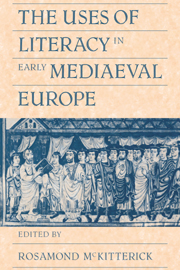Book contents
- Frontmatter
- Contents
- List of illustrations
- Contributors
- Preface
- Abbreviations
- Introduction
- 1 Literacy in Ireland: the evidence of the Patrick dossier in the Book of Armagh
- 2 Anglo-Saxon lay society and the written word
- 3 Administration, law and culture in Merovingian Gaul
- 4 Literacy and the papal government in late antiquity and the early middle ages
- 5 Literacy and the laity in early mediaeval Spain
- 6 Aspects of mediaeval Jewish literacy
- 7 Writing in early mediaeval Byzantium
- 8 Literacy displayed: the use of inscriptions at the monastery of San Vincenzo al Volturno in the early ninth century
- 9 Royal government and the written word in late Anglo-Saxon England
- 10 Literacy in Carolingian government
- 11 Text and image in the Carolingian world
- Conclusion
- Index
3 - Administration, law and culture in Merovingian Gaul
Published online by Cambridge University Press: 07 December 2009
- Frontmatter
- Contents
- List of illustrations
- Contributors
- Preface
- Abbreviations
- Introduction
- 1 Literacy in Ireland: the evidence of the Patrick dossier in the Book of Armagh
- 2 Anglo-Saxon lay society and the written word
- 3 Administration, law and culture in Merovingian Gaul
- 4 Literacy and the papal government in late antiquity and the early middle ages
- 5 Literacy and the laity in early mediaeval Spain
- 6 Aspects of mediaeval Jewish literacy
- 7 Writing in early mediaeval Byzantium
- 8 Literacy displayed: the use of inscriptions at the monastery of San Vincenzo al Volturno in the early ninth century
- 9 Royal government and the written word in late Anglo-Saxon England
- 10 Literacy in Carolingian government
- 11 Text and image in the Carolingian world
- Conclusion
- Index
Summary
Merovingian Gaul was, in certain respects, a bureaucratic society; it was ‘a society used to, needing and demanding, documents’. This is not to say that documents were used equally by everyone, or in all parts of the Merovingian realm, but that they were regarded as useful by those classes of people for whom we have any quantity of evidence. And while most of the people who feature prominently in the sources were members of the secular or ecclesiastical elite, it is clear from administrative and legal texts that literacy was not confined to the highest stratum of society.
Certainly lay and ecclesiastical magnates had literate administrators, servants and slaves on their estates and in their households. In his account of the trial of Bishop Egidius, Gregory of Tours refers both to a diocesan and to a royal archive in which copies of correspondence were preserved, the former at Rheims and the latter at Chelles. Fragments of financial records from Tours show something of the complications of estate management, and also of the need for documentation. The agents of a great monastery or of a secular magnate must have been able to keep such accounts, although there would have been no need for them to have been as learned as the slave of the senator Felix, Andarchius, who was said by Gregory of Tours to be well versed in Vergil and the Theodosian Code. Felix may have been an exception, but if he was it was because of the extent of his learning, not because of his literacy.
- Type
- Chapter
- Information
- The Uses of Literacy in Early Mediaeval Europe , pp. 63 - 81Publisher: Cambridge University PressPrint publication year: 1990
- 4
- Cited by



